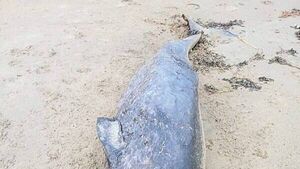Whale species never seen in Irish waters washes up on Donegal coast

Eva Osborne
A Narwhal, an Arctic species of whale never seen in Irish waters, has been found dead and stranded off the Donegal coastline.
This finding is the first recording of the species in Irish waters, the National Parks and Wildlife Service (NPWS) has confirmed.
The body of a female Narwhal was retrieved by the Irish Whale and Dolphin Group, working with regional staff in the National Parks and Wildlife Service.
The Narwhal is a toothed whale found exclusively in the Arctic waters of the North Atlantic, north of 60°.
The initial discovery was made by a family walking along Sweet Nellies Beach on the Inishowen Peninsula, who reported the sighting of a small, stranded 2-3m whale or dolphin to the Irish Whale and Dolphin Group.
Volunteers from the IWDG responded quickly and arrived at the scene to recover the carcass and collect skin samples.
The IWDG and NPWS regional staff worked together to retrieve and transport the carcass to the Regional Laboratory in Cork for post-mortem examination and tests.
Speaking about the discovery, Minister for Nature Christopher O’Sullivan said: “I’d like to thank everyone who was involved in retrieving the stranded Narwhal for their rapid response and collaboration, from the young people who initially spotted it on the beach and raised the alert, to the dedicated teams in the Irish Whale and Dolphin Group, the Regional Veterinary Laboratory in Cork and the National Parks and Wildlife Service of my own Department.
“This is a significant event and it is important that we try to find out more about why this species arrived on our coastline.
"An examination is underway which I hope will reveal important details about its life and history, and shed some light on the reasons why it arrived on our shores.
"The Narwhal is an arctic species that is mainly found in cooler waters. Findings like this are a stark reminder of the vulnerability of wildlife in the face of a changing climate, and the need to protect them.”
Niall Ó Donnchú, director general of the NPWS, said:“We can confirm that a female Narwhal, a species never before recorded in Ireland, was discovered in Co Donegal last weekend and has since been retrieved for scientific examination. This is an extraordinary and unprecedented event.
"I want to acknowledge the swift actions of the family who reported the stranding, as well as the rapid and professional response by the Irish Whale and Dolphin Group and our NPWS regional colleagues.
“As we await the results, NPWS will continue to work closely with our partners to monitor Ireland’s marine environment and to better understand the impacts of climate and ecological change on vulnerable species. Each event like this reminds us of the importance of sustained scientific vigilance and public awareness in protecting our natural world.”
There are an estimated 170,000 living Narwhals worldwide. Male Narwhals are famous for their long tusks, and they are often dubbed the unicorns of the sea.
The population is threatened by the effects of climate change, such as reduction in ice cover and human activities such as pollution and hunting.
Narwhals have been hunted for thousands of years by Inuit in northern Canada and Greenland for meat and ivory, and regulated subsistence hunting continues to this day.
Narwhals are rarely recorded outside the Arctic with the last stranding record in western Europe, when a young male washed up dead in Belgium in 2016.
Prior to that record, two females stranded in the Thames Estuary, England in Kent 1949.
The only sightings are of two off Orkney and one off Aberdeenshire in Scotland in 1882 and one in the Hebrides in 1976. This is the 10th stranding record of Narwhal in western Europe and only the fourth female.
The IWDG is continuing to conduct an examination as part of a Deep Diving and Rare Investigation Programme to understand more about these kinds of rare strandings.





